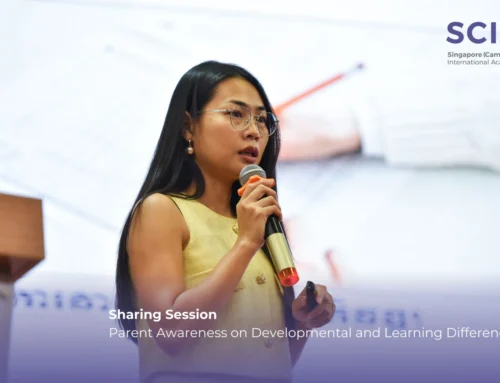Why Speech Therapy Matters for Multilingual Families in Phnom Penh
Phnom Penh is a wonderfully multilingual city—many children grow up hearing Khmer at home and English (or another language) at school. While this can be a strength, some children still experience speech or language delays that make it hard to express ideas, follow instructions, or join conversations. That’s where speech therapy comes in. At OrbRom Center in Phnom Penh, speech therapy supports bilingual and multilingual learners without asking families to “pick one language.” Instead, we build skills in the languages that matter most to your child’s life.
Parents often worry that two languages “cause” delays. Research doesn’t support that idea. If a delay exists, it shows up across languages—and targeted therapy can help in both. If you’re unsure whether your child needs support, start with the basics: what speech therapy is and how it works. Our overview, What Is Speech Therapy?, explains the process in plain language.
The Bilingual Advantage—And When to Seek Help
Growing up with two languages offers long-term benefits: flexible thinking, cultural connection, and broader academic opportunities. Still, children may need speech therapy if you notice any of the following across both languages:
-
Very limited vocabulary or short, incomplete phrases
-
Difficulty following routine instructions
-
Sound errors that make speech hard to understand after age-appropriate windows
-
Frustration or behavior changes when trying to communicate
If you’re seeing several of these signs, read our guide on Speech and Language Delay in Children and consider a consultation. OrbRom’s team can complete targeted assessments to distinguish typical bilingual development from true delay or disorder, then recommend the right next steps.
How OrbRom Center Tailors Speech Therapy for Bilingual Learners
We design therapy so children practice the words, sounds, and sentence patterns they actually need at home, in class, and in Phnom Penh community settings. A typical plan may include:
-
Articulation & Phonology: Teaching accurate sound production in both languages, starting with the contexts (home, school) that matter most.
-
Core Language Skills: Building vocabulary, grammar, and sentence structure—then transferring success between languages.
-
Functional Communication: Role-playing school routines, greetings, and social exchanges common in Phnom Penh classrooms and playgrounds.
-
Caregiver Coaching: Easy, five-minute strategies for daily routines—mealtime, bath time, school pickup—to reinforce therapy gains.
If you’re new to the process, see our guide: A Parent’s Guide to Choosing a Speech Therapist in Cambodia.
Early Support Makes a Big Difference
The earlier you begin, the faster children tend to make progress. Brain plasticity is highest in early childhood, so building strong foundations early pays off for years. Learn more in Early Intervention: Why Starting Speech Therapy Early Matters. If your child is older, don’t worry—effective therapy works at any age, and we regularly support school-aged children and teens in Phnom Penh.
What Sessions Look Like at OrbRom
Sessions are engaging, purpose-driven, and aligned with school expectations in Phnom Penh. You might see:
-
Play-based learning for preschoolers (turn-taking games, object labeling, picture sequencing).
-
Curriculum-connected practice for primary students (answering “wh” questions, retelling stories, writing support).
-
Social communication work (initiating conversations, perspective-taking, problem-solving).
Therapists choose the language of instruction strategically. For example, we may build a new concept in the dominant language first, then bridge to the second language. Families never have to “drop” a language to succeed; we promote balanced growth.
If your child is just starting school, OrbRom’s inclusive Preschool Program in Phnom Penh blends speech-language goals with classroom readiness—ideal for children who need extra support with listening, following routines, or expressing needs.
Will Two Languages Slow My Child Down? Let’s Bust the Myths
A common fear is that using two languages will “confuse” a child or worsen a delay. The reality is more nuanced. See our primer on Bilingual Children & Speech Therapy—Myths and Facts. The short version: multilingual exposure is not the cause of a disorder, and therapy can (and should) support both languages when they’re part of daily life.
How Parents Can Help at Home (Five-Minute Wins)
Consistency beats intensity. Small, steady routines deliver big gains:
-
Narrate the day: Name objects and actions in whichever language you’re using.
-
Offer choices: “Do you want water or milk?”—great for vocabulary and sentence starters.
-
Wait time: Ask, then pause 5–7 seconds so your child can process and respond.
-
Expand and model: If your child says “ball,” reply “Yes, big ball!” to add words/structure.
-
Repeat across languages: If you model a target in Khmer, try it later in English (or vice versa).
Getting Started at OrbRom Center
Your journey typically includes:
-
Intake & Goals: Share priorities and school expectations.
-
Assessment: Identify strengths and growth areas; rule in/out co-occurring needs.
-
Personalized Plan: Frequency, focus areas, and home practice.
-
Progress Reviews: Data-based updates and adjustments.
Curious whether your child is ready now? Read Signs Your Child Might Need Speech Therapy to compare what you’re seeing at home and school.
For families seeking comprehensive support, start here: Speech Therapy at OrbRom Center. We also offer coordinated assessments and a supportive preschool program to streamline care under one roof in Phnom Penh.
The Phnom Penh Promise: Communication That Connects
Every child deserves a voice that carries across home, school, and community. With individualized speech therapy at OrbRom Center in Phnom Penh, bilingual and multilingual children don’t have to choose between languages—they can thrive in both. If you’re ready to take the next step, book a consultation and let’s build a plan that fits your family.
For a deeper dive into how we work with delays and early milestones, explore our resource on Speech Therapy & Early Intervention, then visit OrbRom Speech Therapy to get started.







